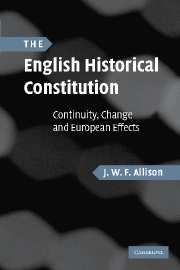Book contents
- Frontmatter
- Contents
- Table of Cases
- Preface
- 1 Introduction
- 2 A historical constitutional approach
- 3 The Crown: evolution through institutional change and conservation
- 4 The separation of powers as a customary practice
- 5 Parliamentary sovereignty and the European Community: the economy of the common law
- 6 The brief rule of a controlling common law
- 7 Dicey's progressive and reactionary rule of law
- 8 Beyond Dicey
- Conclusions and implications
- Bibliography
- Index
7 - Dicey's progressive and reactionary rule of law
Published online by Cambridge University Press: 18 December 2009
- Frontmatter
- Contents
- Table of Cases
- Preface
- 1 Introduction
- 2 A historical constitutional approach
- 3 The Crown: evolution through institutional change and conservation
- 4 The separation of powers as a customary practice
- 5 Parliamentary sovereignty and the European Community: the economy of the common law
- 6 The brief rule of a controlling common law
- 7 Dicey's progressive and reactionary rule of law
- 8 Beyond Dicey
- Conclusions and implications
- Bibliography
- Index
Summary
Since Dicey coined or popularised the phrase ‘the rule of law’ to describe a main and peculiar feature of the English constitution, questions about its character and relationship to parliamentary sovereignty have been crucial in orthodox English constitutional analysis. They are related to further fundamental questions about the rule of law's appeal and the basis for fidelity to the law of the constitution. Dicey's own leading analysis of the rule of law, I will suggest, is not properly understood and these questions are not adequately answered in purely Diceyan analytical terms and without appreciating, in particular, Dicey's own historical view and that of the whig historians upon which he relied but nonetheless formally relegated in his Law of the Constitution. In this chapter, as in previous chapters, I will attempt fully to recognise the European effects upon Dicey's peculiar rule of law, commonly contrasted, for example, with the Continental European notion of the Rechtsstaat. My concern is again the extent to which Dicey's rule of law illustrates both the history in the English historical constitution and interaction with developments in the legal and political communities of Continental Europe.
Dicey's analysis of the constitution was not one-sided in its emphasis on parliamentary sovereignty. It reflected both Coke's controlling common law and Parliament's overriding legislative authority, which had received unequivocal judicial recognition in Lee v. Bude and Torrington Junction Railway Co. fourteen years before the publication of Dicey's first edition of Law of the Constitution.
- Type
- Chapter
- Information
- The English Historical ConstitutionContinuity, Change and European Effects, pp. 157 - 185Publisher: Cambridge University PressPrint publication year: 2007



